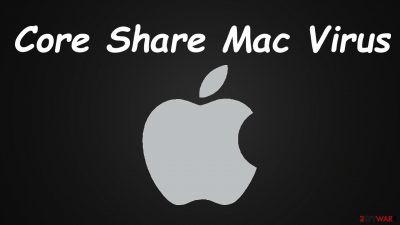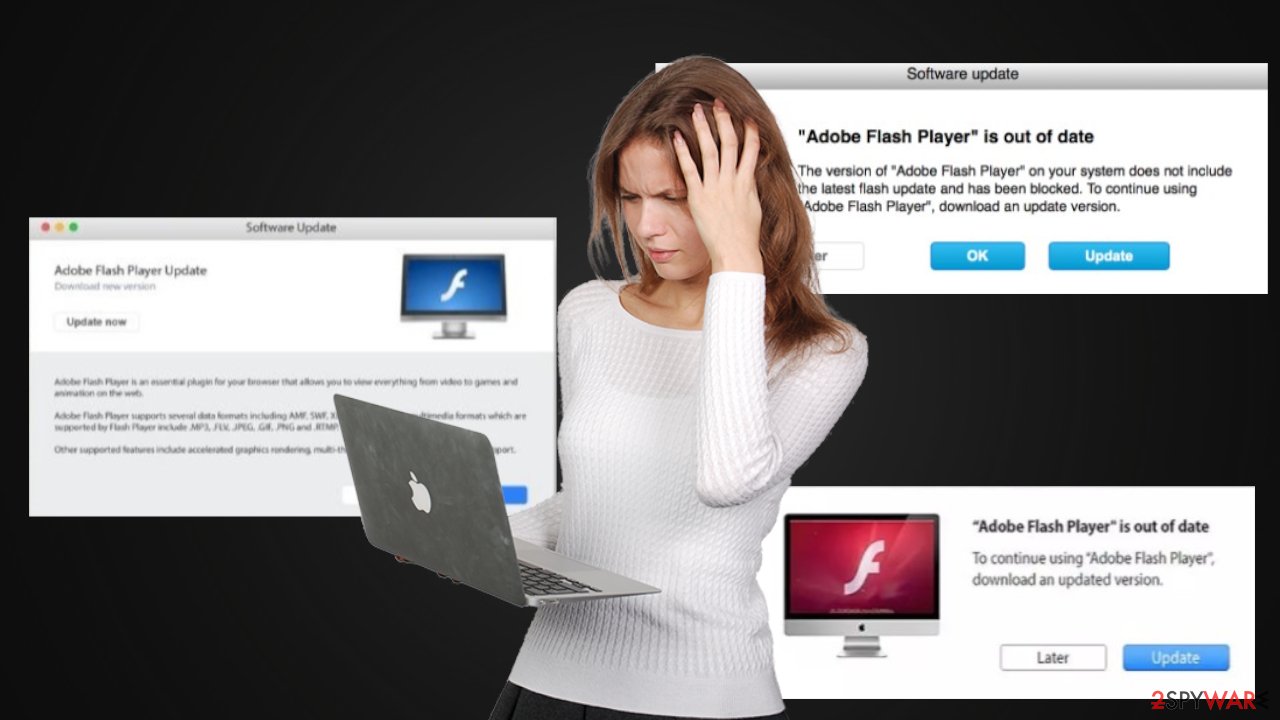Core Share Mac Virus (Easy Removal Guide)
Core Share Mac virus Removal Guide
What is Core Share Mac Virus?
Core Share – a PUP that will cause redirects and deliver tons of misleading ads

Core Share is a pesky computer virus targeting only Mac users. You might have downloaded it along with other software through a technique called bundling. This method to distribute potentially unwanted programs (PUP) is widely used by third-party software vendors that are looking to increase their revenue.
Once this PUP is in the system, various abnormal activities will start happening. You will see an abnormal amount of deceptive ads when visiting your favorite websites, and you might be forced to visit high-risk portals with dangerous contents if redirects are triggered.
Core Share Mac virus might also be capable of recording your browsing-related activities and details. Information such as IP addresses, browsing history, clicked links, device/browser details, geolocations, etc., are collected, and ads are customized based on it. Although it's considered non-identifiable, if these details fell into the wrong hands, you might get in trouble.
Clicking on deceptive ads of the article's culprit might lead you to various questionable portals. Some of them might be harmless and try to sell you something, while others may try to lure out your private details (credit card information, name, address, phone, email, etc.), infect your device in use with malware, and so on.
Therefore you shouldn't joke around with the article's culprit. It has to be removed immediately after any symptoms are spotted. Since you came to us for help, we'll show you how to eliminate this threat forever and repair damaged system sectors.
| name | Core Share |
|---|---|
| Type | Adware, potentially unwanted program |
| Affected systems | All Mac computers |
| Symptoms of infection | An increased amount of ads on frequently visited pages; redirects to suspicious websites; diminished browsing speed |
| Dangers | Data-tracking might lead to privacy loss. Redirects and misleading ads might cause malware infections |
| Distribution | Software bundles, fake Flash Player updates, deceptive ads |
| Elimination | You can remove the intruder by performing a full system scan with reliable anti-malware software |
| System health | Repair virus damage by using the FortectIntego software |

The article's culprit is categorized as a potentially unwanted program, making it not as dangerous as malware. But PUPs can act as a gateway to severe infections such as ransomware, trojans, etc. So if you're bothered by Core Share ads, please don't click on them or try to close them.
Users had reported that when they tried clicking the “Close” or “X” buttons that supposedly should have closed the deceptive ads, new tabs were launched with questionable contents. Therefore, don't interact with them in any way and use our manuals in the next chapter to remove them.
Remove Core Share Mac Virus to stop ads and redirects to dubious portals
This chapter will help you to clean up your device from all cyber threats that might be hiding on it. When it comes to adware, there are two options to get rid of it. You can either scan your device with a trustworthy anti-malware tool like the Malwarebytes software, or you can try and do the dirty work yourself.
When removing a PUP manually, you risk overlooking crucial files that might cause infection renewal. In some cases, you might not even be capable of doing it as the necessary uninstaller won't be present. But if you're willing to risk and perform the removal manually, we'll help you by providing guidance. Please follow these illustrated instructions to remove Core Share virus from your Mac:
- From the menu bar, select Go > Applications.
- In the Applications folder, look for all related entries.
- Click on the app and drag it to Trash (or right-click and pick Move to Trash)
![Uninstall from Mac 1 Uninstall from Mac 1]()
To fully remove an unwanted app, you need to access Application Support, LaunchAgents, and LaunchDaemons folders and delete relevant files:
- Select Go > Go to Folder.
- Enter /Library/Application Support and click Go or press Enter.
- In the Application Support folder, look for any dubious entries and then delete them.
- Now enter /Library/LaunchAgents and /Library/LaunchDaemons folders the same way and terminate all the related .plist files.
![Uninstall from Mac 2 Uninstall from Mac 2]()
If you weren't able to find Core Share or after its removal, the deceptive ads and redirects still continue, we strongly recommend downloading the SpyHunter 5Combo Cleaner security software. A scan with it will reveal all PUPs hiding on your Mac and suggest removing them.
Furthermore, a full system scan performed with a reliable security tool would uncover all malicious files and entries. Cybercriminals upload malware to hacked websites and spread it without users even clicking any buttons via a technique called drive-by downloading.[1]
Severe malware could be hiding on your Mac, and you wouldn't even know about it. Trojans, keyloggers, and similar infections may secretly gather info about you. Only reliable security software is capable of detecting, isolating, and removing such cyber threats.
And lastly, a proper security tool will prevent you from installing potentially unwanted programs. It will also block entrance to high-risk websites. Investing a couple of dollars to raise your cybersecurity could save you thousands in data recovery costs.
Repair virus damage to ensure smooth performance
No matter how insignificant they seem, all computer infections make tons of alterations to core system files and settings. That's done to establish persistence. These changes might severely diminish the device's stability, performance, and usability and even cause a complete system failure.
That's why after you remove Core Share virus, you must take care of the overall system health. Unfortunately, the manual repair is not possible as there's no way to determine which settings were affected and to what extent. Therefore you must use a compatible system diagnostics tool.
IT professionals[2] highly recommend using the FortectIntego software. It's probably the best Mac optimizer on the market, as many users are raving about it. In addition, it also offers virus protection and might also stop Zero Day[3] vulnerability attacks. Therefore it's a great all-in-one tool for every Mac.
How to prevent from getting malware
Protect your privacy – employ a VPN
There are several ways how to make your online time more private – you can access an incognito tab. However, there is no secret that even in this mode, you are tracked for advertising purposes. There is a way to add an extra layer of protection and create a completely anonymous web browsing practice with the help of Private Internet Access VPN. This software reroutes traffic through different servers, thus leaving your IP address and geolocation in disguise. Besides, it is based on a strict no-log policy, meaning that no data will be recorded, leaked, and available for both first and third parties. The combination of a secure web browser and Private Internet Access VPN will let you browse the Internet without a feeling of being spied or targeted by criminals.
No backups? No problem. Use a data recovery tool
If you wonder how data loss can occur, you should not look any further for answers – human errors, malware attacks, hardware failures, power cuts, natural disasters, or even simple negligence. In some cases, lost files are extremely important, and many straight out panic when such an unfortunate course of events happen. Due to this, you should always ensure that you prepare proper data backups on a regular basis.
If you were caught by surprise and did not have any backups to restore your files from, not everything is lost. Data Recovery Pro is one of the leading file recovery solutions you can find on the market – it is likely to restore even lost emails or data located on an external device.
- ^ Forrest Stroud. Drive-By Download. Webopedia. Online tech dictionary.
- ^ Uirusu. Uirusu. Spyware news and security.
- ^ Zero-day (computing). Wikipedia. The free encyclopedia.


